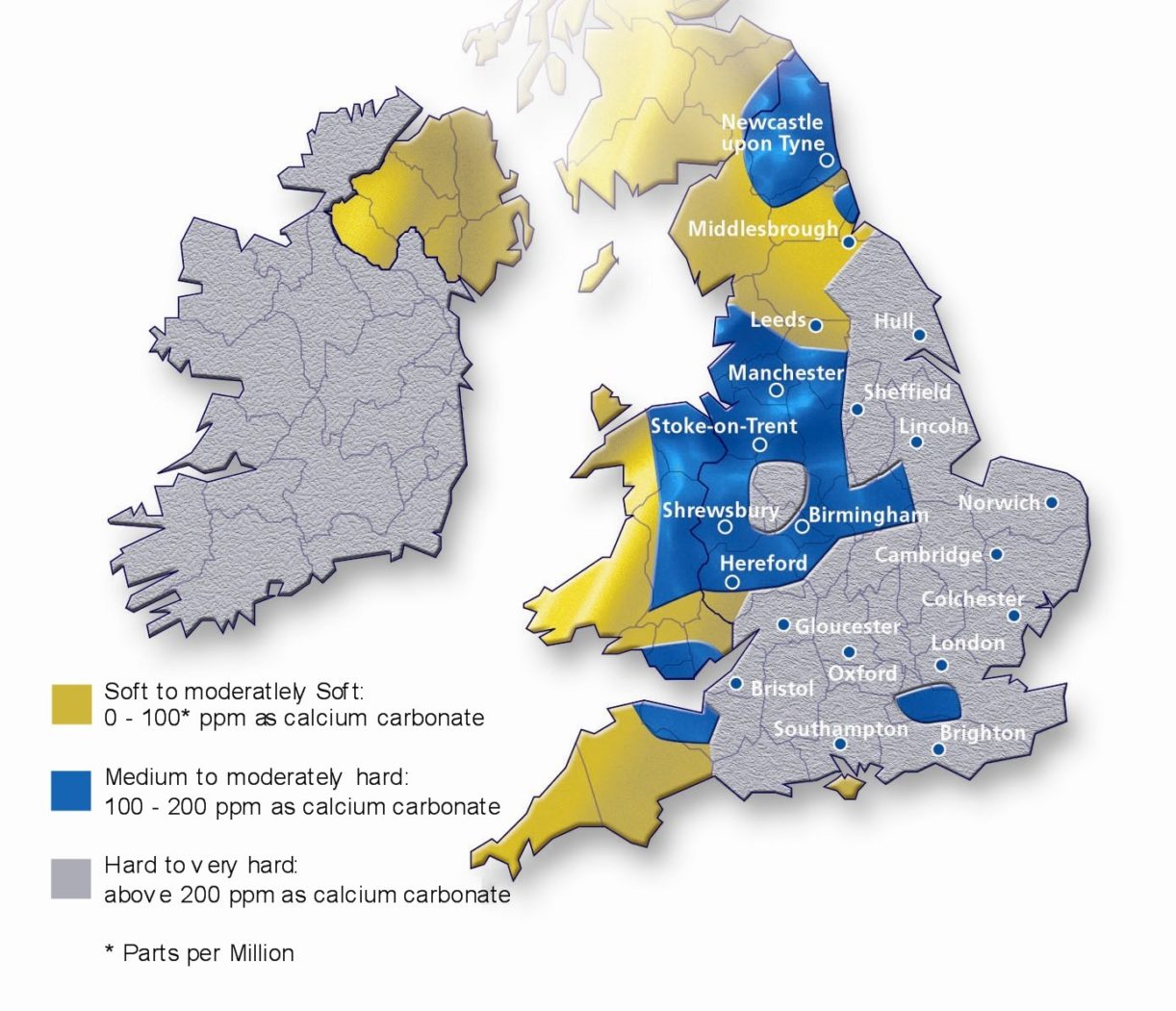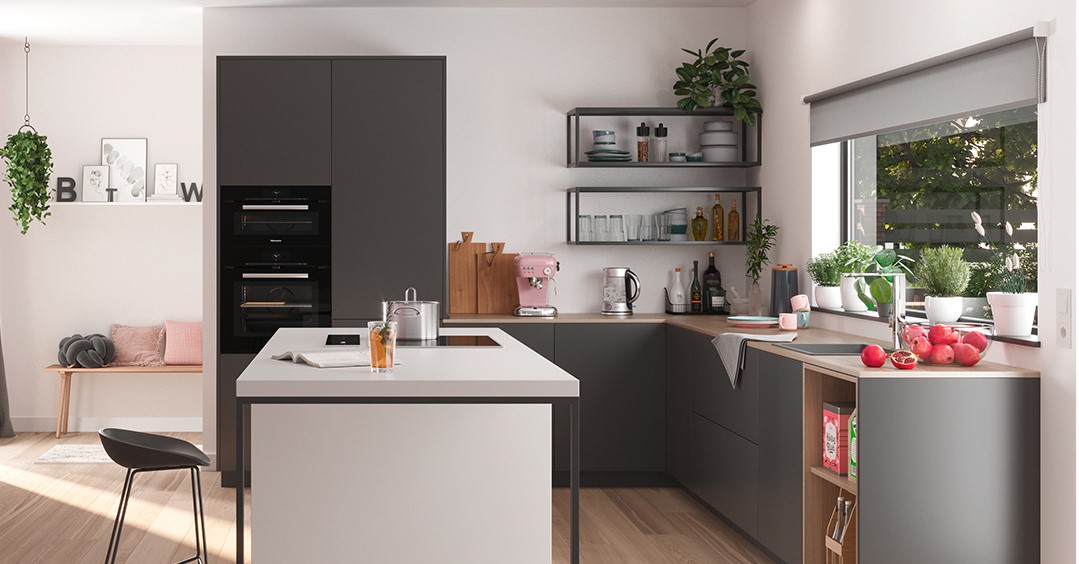Your basket is currently empty!

We have all seen the effects limescale has on our household appliances. Over the years, limescale can build up in pipes and various household appliances like the washing machine, kettle etc. However, do we really understand where this limescale comes from and how to limit the damage it causes? Limescale occurs because of the calcium and other hardness minerals present in our water. It is estimated that over 60% of us in the UK live in hard water areas and as such, much of the UK is classified as having hard or very hard water.
Rainwater is naturally soft but once it flows over or peculates through rocks (such as limestone) on its way to a reservoir, it picks up natural hardness minerals, such as calcium carbonate and magnesium. When these minerals enter the water, it makes the previously soft water, hard. As such, hard water is defined as having a higher mineral content. These minerals are great for drinking water but can lead to scale in your appliances and surfaces around the home especially where water is heated.
In this article, you can find out more about which areas of the country suffer from the hardest water, the effects it has on your home and the benefits of softened water.
How Hard is the water in my area?
A glance at the map above shows that areas of hard water can predominantly be found to the south of a line drawn from Middlesbrough in the North to Bristol and Plymouth in the south with hardest water of all in Norfolk, Suffolk and the South East of England. The reason for this being that the water in these regions is drawn from areas made up of primarily, limestone and chalk rocks. These rocks have a high concentration of calcium and magnesium minerals, which cause the mineral content of water to increase and in turn harden. From the same map above, it can be seen Scotland and Wales have larger areas of soft to only moderately hard water. The exceptions to both are areas of relatively soft water around Birmingham and parts of London.
If you want to test the hardness of your water, try BWT FREE hard water test kit and find out how hard your water instantly. Simply enter the coupon code HWTK1 at the checkout and pay our standard P&P or add to a qualifying order for free delivery
What are the common effects of hard water on your home?
- When water is heated in your kitchen appliances, the calcium in the water forms limescale, affecting the overall health and lifespan of your appliances such as kettles, dishwasher and washing machine.
- The limescale can also have an impact on the performance and efficiency of your heating system. The accumulation of limescale in the heating system can have an insulating effect as well as reducing the volume of water moving around the heating loop. This increases the energy required to heat the water and the amount of stored energy available to heat the radiators.
- Hard water can make your skin increasingly dry and itchy and if you have Eczema, the water can leave your skin feeling more uncomfortable.
- Your clothes, unfortunately, are also affected in hard water soaps and detergents are harder to rinse away so fabrics can lose their softness, feel scratchy to the touch. and their colour fades as well.
- The extra minerals present in the water asks shampoos and conditioners to work harder washing natural oils way which can cause hair to become dull dry and lifeless.
- the dissolved mineral salts can leave water marks on your cutlery, glasses, kitchen and bathroom taps and sinks. In fact, it causes soap scum on bathroom surfaces such as bathtubs and toilets, which is difficult to remove.
- Hard water will eventually cost you more money because you will have to invest in repairing your appliances and purchasing cleaning products more frequently, which will not only affect your household budget but will also harm our Planet Blue.
How to Soften hard water?
One of the biggest problems of hard water on your home is the build-up of limescale on home appliances and surfaces. According to research commission by BWT and reported in the Mirror, one third of Brits believe the water in their area has damaged their home appliances, including kettles, washing machines and showers.
When we soften hard water, we effectively remove the minerals that cause limescale using a process known as Ion exchange and so protect our homes. Unlike many other forms of scale control the conditioning effect is permanent and brings with other benefits that can be enjoyed by you and your family all around your home.
With no limescale kitchens and bathrooms can be cleaned quicker, bright surfaces like chrome, glass and ceramics stay looking new for longer. There are also financial savings to be made by not needing to buy harsh and expensive specialist cleaning chemicals.
In the laundry room you can use less washing powders, detergents and conditioners as softened water lathers and suds are rinsed more easily. Leaving your towels and clothes feeling softer and helping your favourite colours stay vibrant for longer. The need for less products can save you up to 50% depending on the original hardness of your water.
In the bathroom think pamper room your skin, and hair will all benefit from softened water as your natural oils make your skin feel softer and hair look shinier. No scale allows showers to work more effectively while the luxurious soaps suds from you bubble bath and similar products create an almost spa experience.
In fact, softened water has numerous advantages that are ideal for a modern and comfortable lifestyle and gives you and your home a soft, smooth and luxury experience.
With BWT, you can select a water softener that is ideal for your home, ranging from a basic softener to a smart softener that is designed to meet every home requirement.
How does a Water Softener work?
Water Softener works on the ion-exchange principle. When water enters via the control valve, it is channeled through upper distributor into the pressure vessel and down through the resin. The water gives up its calcium and magnesium ions, which stick to the resin and in turn exchanges them for the sodium ions, hence the term ion exchange. The softened water passes into the lower distributor, up through the riser tube and out through the valve into the water supply. The whole process takes place automatically and only requires the user to periodically to top up the softener with salt which is used to create a brine solution for the regeneration of the ion exchange resin.
What are the benefits of softened water for your home?
- Home appliances will often last longer: limescale often gets deposited within the appliances, which can cause premature failure or poor performance.
- No more water-spotting residue: save time and money on cleaning household surfaces. Things like scrubbing granite worktops and ceramics become a thing off the past.
- Lower household bills: using less soaps, detergents conditioners and specialist cleaners can in some case reduce this part of your household budget by up to 50%.
What are the benefits of softened water for you and your family?
- Skin feels better: with skin retaining its natural oils, it will no longer feel dry and tight. This can be especially beneficial to those suffering from Eczema.
- Hair will feel healthier: softened water helps keep your hair feeling, silky, soft and dandruff-free.
- Laundry stays looking fresh: your clothes and towels will feel a lot softer and fluffier. With colours keeping their brightness and lasting for longer.
Hard water can be problematic for a number of reasons, and it is always important to check how hard the water is in your area. However, this does not mean it is impossible to tackle. With the help of a BWT Water softeners, you can overcome many of the obstacles that arise from having hard water in your home. With home appliances lasting longer, your skin and hair feeling healthier and saving money as a whole – the benefits are endless for you, your family and your home.



